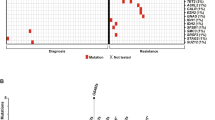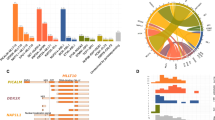Abstract
Receptor tyrosine kinases (RTK) play a significant role in the signal transduction of normal, and malignant hematopoietic cells. We have previously shown that Axl, a novel RTK, is mainly expressed in leukemias of myeloid origin, and that its expression may be associated with cells of monocytic origin. Since expression of certain RTKs in cancer may be associated with different biology and survival, we investigated whether the expression of Axl is associated with clinical characteristics and survival in acute myeloid leukemia (AML). RNA from 54 patients with AML treated in a cooperative group trial was analyzed in a retrospective and blinded manner using a semi-quantitative reverse transcriptase polymerase chain reaction-based assay with primers specific for the Axl gene. Axl expression was found in 19 out of the 54 cases (35%). Axl expression was not detected more frequently in patients of older age, specific FAB categories, or cases with extramedullary disease. However, there existed a correlation between Axl and bcl-2 expression levels. AML cells with high bcl-2 expression showed higher Axl expression (r = 0.32; P = 0.02), and furthermore, Axl transcript numbers were also higher in AML with high CD34 expression (n = 38, r = 0.42; P = 0.008). No significant difference between leukemias expressing and not expressing Axl was found with regard to complete remission rate. However, quantitative Axl expression was associated with worse progression-free and overall survival. Higher Axl levels had worse prognosis for progression-free (β: 0.68, s.e.: 0.28, P = 0.015) and overall survival (β: 0.61, s.e.: 0.31, P = 0.05) using multivariate Cox models adjusted for age, Auer rods and leukocyte counts. In conclusion, in this retrospective analysis, no difference with regard to clinical characteristics at diagnosis was found between AML patients whose leukemia cells show Axl expression vs patients whose cells are Axl negative. The association between Axl and bcl-2 and Axl and CD34 expression in de novo AML needs further investigation. Similarly, the negative impact of Axl levels on outcome should be confirmed in a larger cohort.
This is a preview of subscription content, access via your institution
Access options
Subscribe to this journal
Receive 12 print issues and online access
$259.00 per year
only $21.58 per issue
Buy this article
- Purchase on Springer Link
- Instant access to full article PDF
Prices may be subject to local taxes which are calculated during checkout
Similar content being viewed by others
Author information
Authors and Affiliations
Rights and permissions
About this article
Cite this article
Rochlitz, C., Lohri, A., Bacchi, M. et al. Axl expression is associated with adverse prognosis and with expression of Bcl-2 and CD34 in de novo acute myeloid leukemia (AML): results from a multicenter trial of the Swiss Group for Clinical Cancer Research (SAKK). Leukemia 13, 1352–1358 (1999). https://doi.org/10.1038/sj.leu.2401484
Received:
Accepted:
Published:
Issue Date:
DOI: https://doi.org/10.1038/sj.leu.2401484
Keywords
This article is cited by
-
Gab2 deficiency prevents Flt3-ITD driven acute myeloid leukemia in vivo
Leukemia (2022)
-
Regulation of efferocytosis as a novel cancer therapy
Cell Communication and Signaling (2020)
-
Targeting multiple signaling pathways: the new approach to acute myeloid leukemia therapy
Signal Transduction and Targeted Therapy (2020)
-
Targeting TAM to Tame Pancreatic Cancer
Targeted Oncology (2020)
-
Blockade of Axl signaling ameliorates HPV16E6-mediated tumorigenecity of cervical cancer
Scientific Reports (2017)



